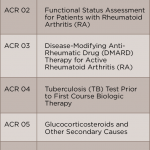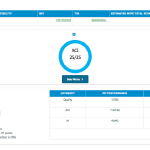The advent of quality-based healthcare, such as the Medicare Access and CHIP Reauthorization Act of 2015 (MACRA), requires rheumatology professionals to demonstrate their practice is based on interventions supported by the best available evidence and that their practice, in turn, provides quality care. These requirements have increased the need for methods to measure and quantify the provision of clinical care and the outcomes of that care.
Evidence developed through typical research methodologies, such as randomized controlled clinical trials, provides excellent support for treatment, but may be difficult to apply to typical clinical care. Rheumatology professionals benefit from research firmly embedded in the realities of clinical care: practice-based evidence.
One form of practice-based evidence is evidence created from the data generated in practice settings. These data are analyzed to describe what is actually occurring in practice and the effect on patients. Practice-based evidence can be used to describe trends in patient care, look at comparative effectiveness of interventions, identify problem areas, help prioritize treatments, address quality improvement and determine where formal research may be needed. This evidence can be used to develop, test and rapidly implement novel measures to define value in rheumatology.1
Gather the Data
Electronic health records (EHRs) have made it much easier to collect data in real time, but significant challenges remain in putting the data to practical use. The data must be aggregated into an interpretable format that can provide real-time continuous information to guide individual patient treatment and clinical quality improvement initiatives. The data collected must be comparable between different clinics so it can be easily collated and compared with established nationwide benchmarks so individual practices can determine their performance for federal quality programs.2
The Rheumatology Informatics System for Effectiveness (RISE) registry (https://www.rheumatology.org/I-Am-A/Rheumatologist/RISE-Registry) is an ideal database to generate practice-based evidence that can be used by rheumatology professionals and researchers alike to improve the care of patients.3
Currently, RISE collects data from more than 1,000 providers from mostly community practices of all sizes across the U.S.
In 2014, the ACR launched RISE as a clinician-friendly method to collect and interpret clinically generated data. The RISE registry collects specific EHR data from member clinics, sends these data to a centralized warehouse where the data are aggregated and analyzed, and then provides the clinic with easily understandable data at the provider and clinic levels in the form of a dashboard. The resulting data can inform patient care, provide evidence of quality care and help management engage in data-driven quality improvement measures.1,2



